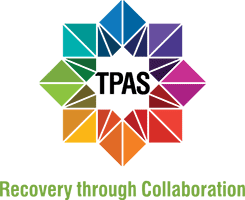A piece by former employee Laura Eshleman, MSW
As an MSW (Master of Social Work) I’ve heard folks in the field for years now speak about the ‘power of vulnerability’, and they usually have a couple of Brene Brown quotes in their back pocket to pepper those conversations. One of those quotes defines that as, “The willingness to show up and be seen with no guarantee of outcome.” In other words, to be vulnerable is to be authentic in spite of the numerous (and sometimes negative) risks involved: of being ignored, of being misunderstood, or of facing shame, to name a few. In preparing to move on from my full-time role as a care coordinator with CooperRiis, I wrote the following piece as an exercise in vulnerability, as well as in solidarity with the residents I’ve worked with who have assumed all of those risks just by entering treatment. Stigma and shame thrive in silence, and CooperRiis’s philosophy aims to dismantle that as much as it empowers residents to live as their full, authentic selves.
A New Experience at CooperRiis
My initial impression of CooperRiis at Asheville, during my first shadow shift as a PRN staff in October 2020, was one that has since been echoed by many others since that time: I could not tell the difference between residents and staff. The environment and the people in it were so relaxed that, in a snapshot, it could have just as easily been a college dormitory. People in casual dress were completing puzzles together, lounging on hammocks outside, and laughing over meals in the dining hall. The couches were worn and cozy, draped with blankets , and inviting aromas wafted from the kitchen.
Throughout my training, I continued to be startled by the numerous contrasts between CooperRiis’ environment and philosophy and the decade plus that I spent in and out of mental health facilities. A lot of these events now run together in my memory in a fog of punishing fluorescent lights, stoic nurses and behavioral technicians, and bland, pre-packaged food wheeled in on carts for each meal. Kind words from staff were few and far between; verbal reprimands, even insults, were shockingly common. I was told, not consulted, which medications would be handed to me; saying “no” to them was non-compliance, and a non-option if I wanted a timely discharge. Going outside for fresh air, with one or two exceptions, wasn’t a thing that happened. Over the course of half a dozen adolescent and adult units across three different states, between ages 14 to 26, I never once had a positive or helpful experience. Nor did I ever feel cared for.
While it should be noted that inpatient and residential levels of care are designed for different levels of mental health acuity, I gradually learned that my lived experience (which was almost 10 years behind me when I began working at CooperRiis) is unfortunately congruent with the history of many residents and families whom we serve, at various levels of care. I have lost count of the newly admitted residents I’ve worked with who express anxiety about starting treatment or the family members I’ve spoken with after moving into my position as a care coordinator, who are understandably defensive and mistrustful of our programs due to repeated, traumatic encounters with uglier parts of our country’s mental healthcare system. Some have shared fears that they or their loved ones will “fail again”—while perhaps unintentionally diminishing how systems had ultimately failed them.
The Sad State of Global Mental Healthcare
In 2021, the World Health Organization published a damning report about the state of global mental healthcare, which enumerated the myriad ways in which human rights violations remain widely accepted practices, even in middle and high-income countries. These range from excluding people with mental health conditions from decision-making about their care to coercive medication administration to physical restraint and seclusion. This reality coincides with the recent proliferation of costly for-profit treatment centers, particularly for substance abuse and eating disorders (which are all too often unaccredited facilities with few evidence-based practices and little oversight). It is no wonder that people with complicated treatment backgrounds arrive at our doors asking, “How is this place going to be any different?”
Achievable Recommendations
The WHO’s report also outlines clear recommendations for practices that are conducive to the recovery and well-being of people with mental health conditions around the world. After a few years of working full-time at CooperRiis, these seem incredibly simple: deinstitutionalization, holistic approaches, respect for individual legal rights and autonomy, and community inclusion, to name a few. Our “seven domains of recovery” hangs as art on the walls of CRA’s community room, depicted as a puzzle to remind us that all of our parts must be nurtured to thrive as a whole. It is also almost easy to forget that these qualities are still largely the exceptions to the rule rather than standards for mental health treatment.
This is also why so many of the residents and families I just alluded to leave CooperRiis telling us, “This made the difference.”
It is said that the opposite of suffering is joy, and I am honored to say that beyond being part of a program that alleviates the former, I have been part of one that helps people discover the latter.









